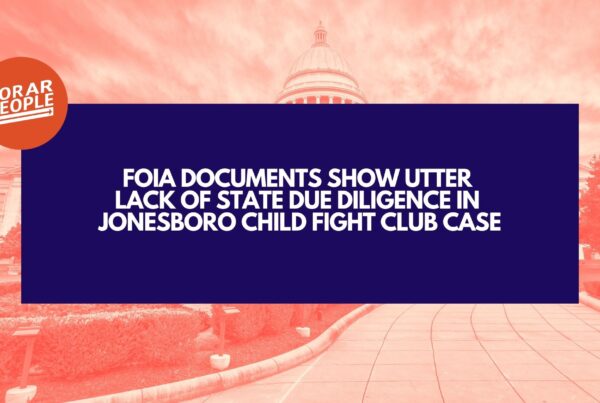- A federal judge blocked Arkansas’s book ban law from going into effect.
- The judge cited two basic violations of the First Amendment: unconstitutional vagueness and restricting content.
- This is a good ruling, but we still have to vote out the people who passed the law to prevent them from trying again.
We’ve talked a lot here at For AR People about SB81/Act 372, Sen. Dan Sullivan’s bill to allow book bans in public libraries. From Craighead County last year to the ongoing fight in Saline County, right wing extremists spearheaded by the hate group Moms For Liberty have targeted libraries across the state.
In early June, several libraries and independent booksellers filed a federal lawsuit against Book Ban Dan’s bill. They argued it violated the First Amendment right to free expression and the Fourteenth Amendment right to due process.
It turns out a federal judge agrees! On July 29, Judge Timothy Brooks of the Western District of Arkansas prevented the law from going into effect.
We’re here to walk you through the order, what comes next in this legal fight, and what it means for Arkansans. We’re pretty excited about this one, though.
After all, who said Book Ban Dan and the Moms for Liberty get to tell us what to think?
What’s In the Order?
Judge Brooks’ order confirms that Act 372 violates the First Amendment rights of those who use libraries and bookstores. There are two reasons for this.
First, laws restricting speech in the United States have to prove what’s called a “compelling state interest” in carrying out the restriction. In other words, the state has to have a really good reason to prevent speech. This is why you can’t yell fire in a crowded theater!
Because of this, laws restricting speech have to be very specific in describing what speech is being restricted and why the state wants to restrict it. Otherwise, laws become “unconstitutionally vague,” and citizens can’t figure out what speech is being restricted and why.
Act 372, Judge Brooks says, “is very poorly drafted.” Kudos to you, Dan. The judge gives a sinister reason for this: “by keeping the pivotal terms vague, local governing bodies have greater flexibility to assess a given challenge however they please rather than how the Constitution dictates.”
In short, Dan and his pals did this on purpose to make it easy for anyone to challenge any book for any reason. Book banners cry about the First Amendment when they think they’re being persecuted, but have no problem in restricting other Arkansans’ right to think for themselves. The law uses the word “appropriateness” to describe which content can be challenged, but, surprise, Senator Sullivan failed to put a legal definition of appropriateness in the law!
What counts as genuinely harmful for a ten-year-old might not count for an older teen who’s nearly eighteen, but there’s no provision in the law to distinguish between different minor ages. Even worse, because “appropriateness” isn’t defined, there could be a big geographical difference in what counts. But laws must create consistency. “A work cannot be deemed “obscene” in Alma, Arkansas, but not obscene in Little Rock,” the judge writes.
Judge Brooks seems pretty annoyed by the state’s attempt to handwave this fatal vagueness away: “It is difficult, if not impossible, to assess a challenged book’s “appropriateness” without considering its content, message, and/or viewpoint.”
That’s the second reason Judge Brooks put a stop to this nonsense.
Content somebody in any level of government – including, say, a county judge – finds objectionable can’t be banned, not even because it might be harmful to minors. Freedom of speech has to include ideas we may not like. Judge Brooks makes this point eloquently: “The librarian’s only enemy is the censor who judges contrary opinions to be dangerous, immoral, or wrong.”
Judge Brooks writes firmly on this point: “It is the threat of state censorship that is at issue here.” We couldn’t agree more. Vague laws that threaten censorship can’t stand in a functioning democracy, and we applaud Judge Brooks for coming to the obvious conclusion that Book Ban Dan’s law violates the Constitution.
What’s Next for the Book Ban?
First, this excellent ruling means that a lawsuit against Crawford County, which preempted Act 372 by removing books to a “restricted section” in their library in 2021, may succeed on the merits and the library will be forced to move the books back.
Second, while we don’t yet know for sure, AG Griffin will almost certainly appeal the ruling to the Eighth Circuit Court of Appeals. Right now, all we have from his office is a statement that he will “continue to vigorously defend the law” after reviewing the ruling. We expect a firmer statement from him within a few weeks.
We have some advice for you, Tim: let it go. Arkansans don’t want book bans, and we don’t need book bans. We can think for ourselves.
Finally, we don’t want anyone to think that this means we can let up the pressure on those who want to restrict what we can read and think. Like we stated in our piece on voting rights a few weeks ago, this ruling doesn’t do much else besides maintain the status quo prior to Act 372. Moms for Liberty and the Republican Women are still out there.
This means it’s up to us to vote in new lawmakers next year who will pass legislation that affirmatively defends our rights.
We’ll close with a final quote from Judge Brooks. He writes that “The librarian curates the collection of reading materials for an entire community, and in doing so, he or she reinforces the bedrock principles on which this country was founded.”
We couldn’t agree more, and we’ll continue to do whatever we can to defend our public libraries and those bedrock principles they represent. We invite all Arkansans to see these book bans for what they are: power grabs by a vocal minority who are scared of dissent.
But the possibility of dissent, the acceptance of difference, have always made Arkansas strong.





